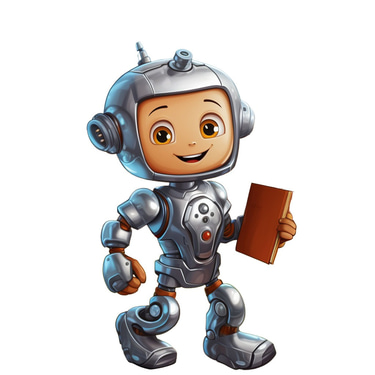"The Importance of AI Education for Kids: 5 Positive Reasons to Empower Young Minds"
11/3/20243 min read


Empowering the Next Generation: Why AI Education is Critical for Children
Introduction
In today's rapidly evolving world, artificial intelligence (AI) is changing everything around us, from the way we interact with technology to the way we work and live. As AI continues to spread throughout our society, it is crucial to prepare the next generation with the knowledge and skills necessary to thrive in an AI-driven world. This is where AI education for kids comes into play.
AI education is not about turning kids into AI experts; it's about helping them with the Basic skills and understanding they need to navigate and shape an AI-powered future. It's about equipping them with the tools to become informed, creative, and ethical individuals ready to take on the AI era's challenges and opportunities.
Why is AI Education Critical for Children?
AI education is about more than just preparing kids for future jobs; it's about helping them to become responsible, informed, and creative citizens in an AI-driven world. Here are five compelling reasons why AI education is essential for kids:
Explaining AI and Understanding Its Impact: AI can often seem like a mysterious and complex topic, shrouded in technical jargon and futuristic concepts. AI education helps kids demystify AI, providing them with a clear understanding of what AI is, how it works, and its potential impact on their lives and the world around them.
Developing Critical Thinking and Problem-Solving Skills: AI is driven by algorithms (Step-by-step instructions), which are essentially sets of instructions that computers follow to perform tasks. By learning about algorithms and AI, kids develop critical thinking and problem-solving skills as they analyze and break down complex problems into smaller, manageable steps.
Fostering Creativity and Innovation: AI is not just about automating tasks; it also opens up new possibilities for creativity and innovation. AI education encourages kids to explore the creative applications of AI, helping them to use AI tools to express their ideas, solve problems in innovative ways, and shape the future.
Preparing for AI-Driven Jobs and Opportunities: AI is rapidly transforming the job market, creating new opportunities and requiring new skill sets. By introducing kids to AI early on, we prepare them to navigate this changing landscape, equipping them with the knowledge and skills they need to pursue future careers in AI-related fields.
Promoting Responsible AI Citizenship: As AI becomes increasingly integrated into our lives, it is essential to promote responsible AI citizenship. AI education helps kids understand the ethical implications (right and wrong in using) of AI, fostering a sense of responsibility and awareness as they interact with AI-powered technologies.
Real-Life Examples of AI Education for Kids
AI education is not just a theoretical concept; it is already being implemented in various ways to empower young minds. Here are a few real-life examples:
Coding Camps and Workshops: Numerous coding camps and workshops are introducing kids to the basics of programming and AI. These hands-on experiences allow kids to experiment with AI concepts and develop essential coding skills.
Interactive AI Games and Apps: Educational games and apps are making AI concepts more accessible and engaging for kids. These interactive tools allow kids to learn about AI through play, fostering curiosity and a positive attitude towards AI.
AI-Powered Learning Tools: AI-powered learning tools are being integrated into classrooms to personalize education and provide adaptive learning experiences. These tools can tailor instruction to individual student needs, helping kids learn more effectively.
AI Robotics Competitions: AI robotics competitions are encouraging kids to apply their AI knowledge to real-world challenges. These competitions provide a platform for kids to showcase their creativity and problem-solving skills while learning about AI robotics.
AI Literacy Programs: AI literacy programs are being implemented to raise awareness about AI among kids and their families. These programs provide resources and information to help kids understand AI and its impact on their lives.
Conclusion
AI education is not just about preparing kids for the jobs of the future; it's about helping them to become responsible, informed, and creative citizens in an AI-driven world. By introducing AI education early on, we can equip the next generation with the knowledge and skills they need to thrive in a rapidly changing world, shape the future of AI, and make a positive impact on society.
Additional Suggestions:
